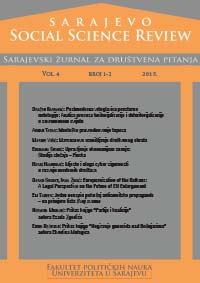Marcuseovo osmišljanje društvenog obrata
Marcuse’s Conception of Radical Social Change
Author(s): Maroje VišićSubject(s): Political Philosophy, Social Philosophy, Marxism, Labor relations, Social Theory
Published by: Fakultet političkih nauka - Univerzitet u Sarajevu
Keywords: Herbert Marcuse; critical theory; concrete philosophy; individual; liberation; alienation; labour;
Summary/Abstract: In attempting to demonstrate how Marcuse foresees the possibility of radical social change the author positions Marcuse’s early writing in the center of this paper, as well as his best known works in which Marcuse offers his vision of the form of the new society. Marcuse’s thought is defined twofold: first in his critique and repelling of positivism which in Marcuse’s opinion holds and obstructs social change. And secondly, Marcuse’s thought is defined by dialectical tension between essence and appearance, between what the world is and what it could be in terms of that which it is. In this attempt Marcuse points to the historical possibilities contained in his definition of the essence as the totality of social relations. Though, Marcuse already in his habilitation demonstrated that society is the medium in which life takes event. Theoretical groundings as shown in the early writings will permeate Marcuse’s later works. The attempt to demonstrate the consistency of Marcuse’s early writings with his later works is also an attempt to respond to his critique.
Journal: Sarajevski žurnal za društvena pitanja
- Issue Year: IV/2015
- Issue No: 1-2
- Page Range: 47-65
- Page Count: 19
- Language: Croatian

